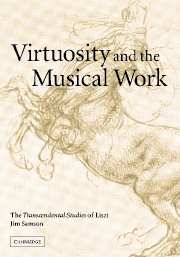5 - Forms and reforms
Published online by Cambridge University Press: 22 September 2009
Summary
IN THE WORKSHOP
Liszt's withdrawal from public pianism in the late 1840s to a post at the Weimar court might be taken as symptomatic of a more general shift in values: from virtuosity to interpretation, from the ‘perfect musical performance’ to the ‘perfect performance of music’, from the performance to the work. Weimar was indeed an appropriate context for this change of mission. Detlef Altenburg has commented perceptively on the two Classicisms that informed Liszt's Modernist agenda there: the Viennese Classicism that culminated in Beethoven and Schubert and the Weimar Classicism that came to fruition in Goethe and Schiller. Liszt was under no illusions about how he fared in relation to Beethoven, but he did nonetheless see his own music, especially from the Weimar years, as drawing the obvious conclusions from Beethoven's legacy. At the same time he entertained high hopes of achieving a working relationship with the Grand Duke Carl Alexander that might prove as fruitful for the arts in general as that between Goethe and the Grand Duke Karl-August. The ‘Altenburg’, his residence for most of this period, was a powerhouse of radical, reformist thinking about music and the arts throughout the 1850s, even if the ideas themselves (as distinct from the rhetoric surrounding them) were not always so very new. At the Altenburg Liszt held court.
- Type
- Chapter
- Information
- Virtuosity and the Musical WorkThe Transcendental Studies of Liszt, pp. 134 - 174Publisher: Cambridge University PressPrint publication year: 2003



